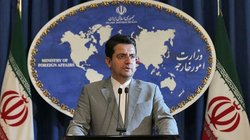 Iran has censured the recent US military movements in Iraq as a violation of the Arab country’s national sovereignty, raising the alarm that the actions could precipitate insecurity and danger in the entire West Asia region.
Iran has censured the recent US military movements in Iraq as a violation of the Arab country’s national sovereignty, raising the alarm that the actions could precipitate insecurity and danger in the entire West Asia region. RNA - “We regard the military activities that the Americans carry out in Iraq as contrary to the will of the Iraqi nation, government and parliamentarians, also against a bill passed by the Iraqi parliament,” Seyyed Abbas Mousavi, Iran's Foreign Ministry spokesman, said on Tuesday.
“We consider the activities in violation of Iraq’s national sovereignty and regard them as a cause for insecurity and danger in the whole region,” Mousavi added.
On Sunday, Iraqi security sources said new US troops had been deployed to Ain al-Asad in the western Iraqi province of Anbar amid reports that the Pentagon was preparing for a new escalation.
Arabic-language Almaalomah news agency cited a security source as saying that planes carrying American soldiers and military advisers had landed at the base.
The reported deployment came after the New York Times said last week that the Pentagon had ordered military commanders to plan for an escalation of American combat in Iraq.
Several American officials told the paper that the Pentagon had ordered planners at the Central Command and in Iraq to draw up a strategy to dismantle Kata'ib Hezbollah, which is part of the anti-terror Popular Mobilization Units (PMU) or Hashd al-Sha’abi.
The US has time and again targeted PMU's positions, blaming the major anti-terror force for rocket attacks against American troops based in Iraq over the past few months, a charge the popular group has strongly denied.
Iraqi lawmakers unanimously approved a bill on January 5, demanding the withdrawal of all foreign military forces led by the United States from the country following the assassination of Lieutenant General Qassem Soleimani, the commander of the Quds Force of the Islamic Revolution Guards Corps, along with Abu Mahdi al-Muhandis, the deputy head of the PMU, and their companions in a US airstrike authorized by President Donald Trump near Baghdad International Airport two days earlier.
Later on January 9, Adel Abdul-Mahdi, the former Iraqi prime minister, called on the United States to dispatch a delegation to Baghdad tasked with formulating a mechanism for the move.
According to a statement released by his office at the time, Abdul-Mahdi “requested that delegates be sent to Iraq to set the mechanisms to implement the parliament's decision for the secure withdrawal of (foreign) forces from Iraq” in a phone call with US Secretary of State Mike Pompeo.
The 78-year-old politician said Iraq rejects any violation of its sovereignty, particularly the US military's violation of Iraqi airspace in the assassination airstrike.
*****
112/940